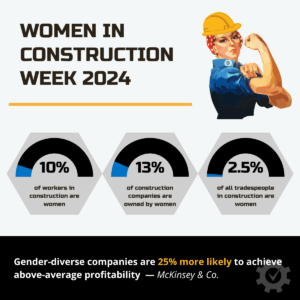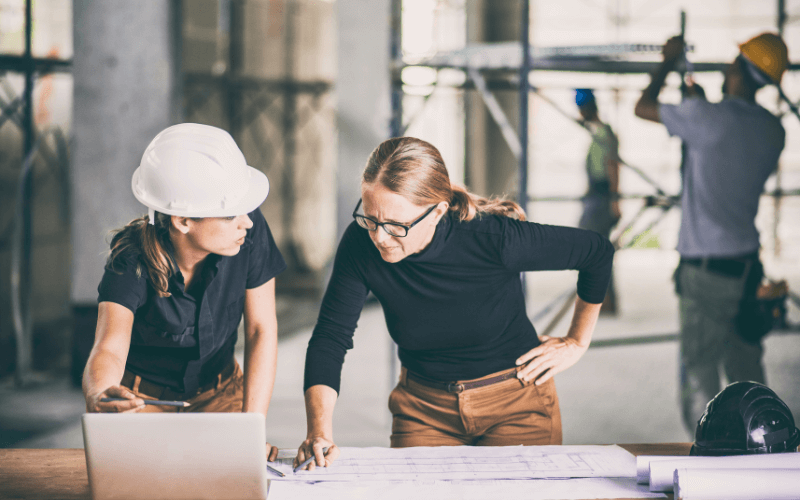The construction industry, traditionally seen as a male-dominated field, has been slowly but steadily changing. Women are not only entering the industry in increasing numbers but are also taking on leadership roles and making significant contributions. Women in construction are pivotal to the industry’s growth and success. Making up about 10% of the construction workforce and owning 13% of construction companies, their impact is undeniable.
Women in Construction Week (WIC Week), celebrated from March 3-9, 2024, is a testament to this shift, highlighting the achievements of women in this sector and encouraging more women to join their ranks.
Why Women in Construction Week Matters
Women in Construction Week serves multiple purposes. It’s a time to recognize and celebrate the hardworking and confident women in the construction industry. It opens doors for more women to explore construction opportunities, promoting gender balance and reducing the stigma associated with women in construction. Moreover, it’s an excellent opportunity for networking, sharing ideas, and fostering innovation within the industry.
The Impact and Importance of Women in Construction
Construction companies that include women in their workforce, especially in executive positions, tend to perform better financially for several compelling reasons. Firstly, gender-diverse teams bring a variety of perspectives and solutions to the table, fostering creativity and innovation, which are crucial in solving complex construction challenges and improving project outcomes. Secondly, women in leadership roles can drive a more inclusive corporate culture that attracts top talent, enhances employee satisfaction, and reduces turnover costs.
Companies with a diverse workforce are also better positioned to understand and meet the needs of a diverse client base, leading to increased customer satisfaction and business opportunities. A report by McKinsey & Co. highlighted that the most gender-diverse companies are 25% more likely to achieve above-average profitability compared to their less diverse counterparts. This correlation between diversity and financial performance underscores the importance of embracing gender diversity as a strategic advantage in the construction industry.
The State and Stats of Women in Construction (USA)
Recent statistics suggest that women make up about 10% of the construction workforce in the United States, with the majority of them holding office and sales positions (just under 87%). Tradespeople roles see a mere 2.5% representation of women, while staff executive positions are held by 14%, and line of executive positions by 7%. Despite being underrepresented, especially in trade and executive positions, the industry is keen on recruiting more women, recognizing the unique skill sets they bring to the field.
The construction sector is expected to grow by 4% between 2021 and 2031, translating into about 168,500 new jobs annually over the decade, creating ample opportunities for women to join and thrive in the industry.

Economic Impact and Earnings
Financially, the construction industry presents a lucrative opportunity for women. Female construction managers earn an average salary of $97,180 per year, which is significantly higher than many other sectors. Furthermore, 13% of all construction companies worldwide are owned by women, with 9% of these firms making more than $500,000 annually.
Women in construction and trade roles earn 30% more than their counterparts in traditionally female-dominated occupations, highlighting the economic benefits of pursuing a career in this field. The relatively small pay gap in construction, compared to other industries, further highlights the equitable opportunities available
Promoting Gender Diversity in Construction
To bridge the gender gap and support women in construction, various initiatives and programs are in place. For instance, the National Association of Women in Construction (NAWIC) and Women Construction Owners & Executives USA offer mentorship, networking, and marketing opportunities to women in the industry. Educational resources and training programs are also increasingly available to prepare women for construction roles, highlighting the industry’s commitment to fostering a diverse and inclusive workforce.
Overall, while women are still underrepresented in the construction industry, there is a concerted effort from various sectors to change this dynamic. The increasing number of women in leadership roles and ownership positions in construction companies signals a positive shift towards greater gender diversity and equality in the industry.
Challenges and the Path Forward
Despite the progress, challenges remain. Women in construction often face gender bias, lack of access to training and mentorship, and workplace cultures that are not always inclusive. Addressing these issues is critical for further increasing the participation of women in the industry. Construction companies are encouraged to develop training programs and local mentorship groups tailored to women’s needs, include more women in the hiring process, and foster workplace environments that value diversity and inclusivity.
Conclusion
As we approach Women in Construction Week 2024, it’s clear that the construction industry is moving towards a more inclusive and equitable future. This week-long celebration is not just about recognizing the achievements of women in construction; it’s about inspiring a new generation of women to build their careers in this dynamic field. The construction industry continues to evolve, and with the participation and leadership of women, it’s set to reach new heights of innovation, diversity, and success.
Women in Construction Week 2024 is more than just a celebration; it’s a call to action for everyone in the industry to support and promote gender diversity. Let’s all take part in this important week to ensure that the construction industry becomes a welcoming and inclusive space for women today and in the future.
The construction industry stands at a crossroads, with the potential to redefine itself as a beacon of gender equality and inclusivity. Celebrating the achievements of women in construction and addressing the systemic barriers they face is essential for building a more equitable future. As the industry continues to grow, embracing diversity and empowering women will not only drive profitability but also ensure a dynamic and resilient workforce ready to tackle the challenges of tomorrow.
